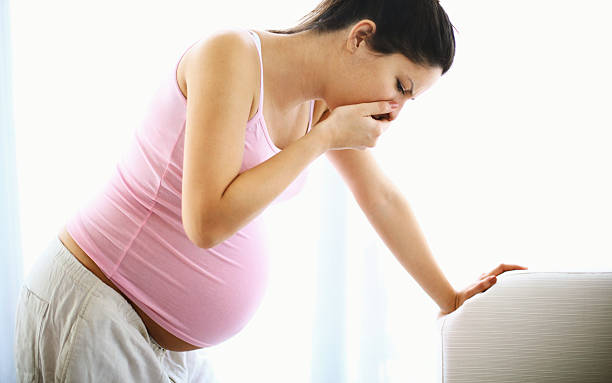
Severe vomiting during pregnancy may cause miscarriage, gynaecologists warn
Maternal health experts have urged pregnant women not to dismiss severe vomiting in pregnancy as a normal pregnancy issue, noting that it can harm the mother and the baby.
They also warned that it can lead to a miscarriage if not properly and promptly treated by qualified medical personnel.
The experts noted that unknown to many people, severe vomiting by a pregnant woman is a serious health issue that could affect the health of the mother as well as the baby, stressing that it can affect the outcome of the pregnancy when poorly managed.
According to the experts, persistent vomiting often leads to dehydration of the woman and can also cause severe damage to the health of the baby if it is not medically attended to promptly and properly.
Severe vomiting referred to as hyperemesis gravidarum, experts say, is a situation where a pregnant woman is unable to retain anything in her stomach the moment she takes it.
Hyperemesis gravidarum, according to the experts, is any combination of nausea, vomiting, dehydration, weight loss, or hospitalisation for nausea, and/or vomiting in pregnancy in the absence of any other obvious cause for these complaints.
Speaking with our correspondent, the experts noted that vomiting in pregnancy is on a spectrum, explaining that the least worrisome is feeling nauseated, followed by some spitting, then some occasional vomiting that is known as morning sickness, and then intractable vomiting where a pregnant woman vomits whatever she puts in her stomach.
Speaking with PUNCH HealthWise, the experts, Prof. Mairiga Abdulkarim and Prof. Oliver Ezechi, who are both consultant gynaecologists, said even though hyperemesis gravidarum is common in our clime, many people do not understand the severity of the condition.
Abdulkarim, who is a Professor of Reproductive Health in the Department of Obstetrics and Gynaecology, College of Medical Sciences, University of Maiduguri explained that such excessive vomiting has no known cause and a pregnant woman can be diagnosed of it if other causes of constant vomiting is ruled out.
He urged physicians treating pregnant women to patiently explain the condition to their patients as some of them assume it is a normal thing while it is not.
He stated that urinary tract infections, malaria, and kidney problem are some issues that can cause a pregnant woman to vomit but noted that if the woman has none of these conditions, then the constant vomiting could be hyperemesis gravidarum.
This condition occurs usually in the first 16 weeks of gestation, the reproductive health expert said, stressing that the major issues associated with severe vomiting are dehydration, and sometimes loss of weight in the woman, and some other problems.
Speaking further with our correspondent, he said, “Under normal circumstances of morning sickness, a woman can vomit once or
twice in a day but in a situation where whatever she eats, she vomits and she is vomiting more than eight, nine, 10 times in a day, we have to consider that as hyperemesis gravidarum.
“Morning sickness and hyperemesis gravidarum can also occur in the first, second, and third month of pregnancy. It can be difficult to differentiate the two without excessive vomiting.
“It can affect both the baby and the mother. When it affects the baby, it occurs as miscarriage, sometimes it may occur as a baby dying in the womb and not coming out – missed miscarriage or missed abortion. Sometimes it may also affect the growth of the baby. That means the baby may not grow well. It can cause poor nutrition and dehydration leading to miscarriage leading to the death of the baby.
“To the mother, it could affect her nervous system because her nervous system is not functioning well, which may lead to brain injury.”
Also speaking with PUNCH HealthWise, Ezechi, who is the director of research at the Nigerian Institute of Medical Research, however, noted that while the condition should not be taken for granted, there are theories that suggest that the outcome of such pregnancies can still be good.
He disclosed that a 2017 research titled ‘Hyperemesis Gravidarum: A Review of Recent Literature’, revealed that there is a “positive association between adverse neonate outcomes and hyperemesis gravidarum”.
He said that compared with infants born to women without hyperemesis gravidarum, rates of low birth weight and preterm delivery were 8 per cent higher than rates among infants born to women with hyperemesis and low pregnancy weight gain.”
He said that in pregnancies associated with severe vomiting, their outcome tends to be better because it shows that the baby’s placenta is well formed and the hormones are well elaborated.
He, however, stressed that a woman who is having such a difficult pregnancy must present to the hospital instead of taking unqualified advice from older women as no two pregnancies and women are the same.
Ezechi stated further that it is essential that husbands of women who are passing through this difficulty are empathetic towards their wives by showing support and care to them.
The experts said the condition can be managed by rehydration of the woman, provision of counselling, and dietary advice to the woman.
“It is not such a terrible condition, it is only when it is not managed properly that there could be problems,” Ezechi said.
Speaking on non-pharmacological ways to manage excessive vomiting and nausea during pregnancy, Abdulkarim said women who are prone to it should avoid fatty foods and oils, at least for the first four months of pregnancy.
He also urged them to take a lot of water and sugary fluids and also take the liquids with straws instead of gulping them down.
They could also take ginger as well as zobo drinks to manage the vomiting, he said.
Credit : Punch





